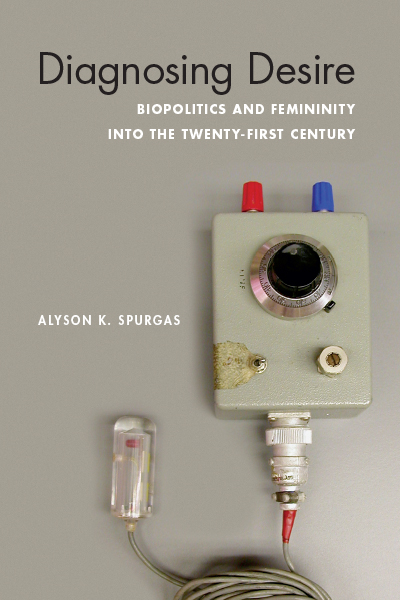Jeffrey T. Nealon’s Fates of the Performative: From the Linguistic Turn to the New Materialism crafts a history of performativity within contemporary theoretical thought. Through the structure of a genealogy, Nealon examines the nascence of performativity and its intersection with biopolitics and neoliberalism to predict not only the future of the performative, but also to imagine new avenues of criticism within the humanities.
Keyword: biopolitics
Review of Diagnosing Desire: Biopolitics and Femininity into the Twenty-First Century by Alyson K. Spurgas (The Ohio State University Press)
In Diagnosing Desire, Alyson K. Spurgas examines female sexual dysfunction, specifically low desire in women, and refuses to take anything for granted. One part history of modern sexology and one part feminist critique of the biopolitics engendered by sex research, Spurgas uses anti-racist, queer, disability studies, and trauma-informed theories to argue that the apolitical and atheoretical approach used in much of the modern science of sexuality confines women’s sexual desire to a purely receptive model. Spurgas problematizes essentialist, anti-intersectional, and hetero- and cisnormative frameworks through which women’s sexual desire has become a problem to be solved through self-improvement and by learning to push through feelings of low desire. Instead, Spurgas offers insights into the lives of women with low desire by attending to their experiences with inequality and trauma, and proposes a new understanding of women’s sexuality—and of femininity more generally—based on prudent and critical attention to power.
Solidarity in Falling Apart: Toward a Crip, Collectivist, and Justice-Seeking Theory of Feminine Fracture
In this essay, I reconceptualize feminized trauma by utilizing a queer crip feminist disability justice framework. This reconceptualizing allows for an intervention in both historical psychoanalytic and contemporary biomedical framings of the experience of gendered and sexual violence, pursuant or sequelic trauma, and associated symptoms. Both historical and contemporary psycho-logics too often imagine gendered and sexual violence as abnormal or exceptional events (e.g., “stranger rape”) which can be treated and cured individually, thus delimiting them within a white, wealthy or middle-class, cis- and hetero-feminine register. As a corrective, within the framework of everyday emergencies, insidious traumas, and cripistemologies of crisis, I position feminine fracturing and falling apart as chronic, and consider abolitionist strategies for survival, care, and solidarity beyond traditional medical frameworks for recovery. This further provides a way to understand dissociation or rather dissociative-adjacent symptomology as real, legitimate, and painful, yet also as sociopolitical products experienced differently across diverse populations—and as mundane, banal, and even expected for some. Here, feminine fracturing is symptom, method, and potential avenue for change or liberation. What does “recovery” look like when feminized trauma is endemic to the point of being so normalized and unexceptional as to be a thoroughly unremarkable part of our everyday cultural backdrop? How is this exacerbated when we examine the experiences of trans women, poor women, and immigrant and BIPOC women and femmes? I posit that there is promise in embracing a fracturing, in falling apart—as antidote to the normative and neoliberal logic of keeping it together.
Review of I’m Not Like Everybody Else: Biopolitics, Neoliberalism, and American Popular Music by Jeffrey Nealon (University of Nebraska Press)
In I’m Not Like Everybody Else, Nealon is not like everybody else (i.e., a poptimist), but rather dissects the position of popular music in American society and culture in the present moment. The title of the book comes from a performance by Ray Davies (former singer for the Kinks) at the Austin City Limits Music Festival in 2006. In a YouTube video of the performance, Nealon notes that when “the song’s titling chorus returns, the hipster ‘Keep Austin Weird’ audience is shown, all in unison, chanting ‘I’m Not Like Everybody Else.'”(68) It is in this example that he sees “the mass individuality logic of biopolitics in one concise screenshot: I’m ironically just like everybody else in and through my axiomatic self-assurance that I’m not like everybody else.” (68) This passage perfectly sums up Nealon’s thesis: through a capitalism that aims to make everyone a mass individual, people reaffirm their identity “not” being like everyone else, while at the same time failing to produce their identity positively.
Review of Fearing the Black Body: The Racial Origins of Fat Phobia by Sabrina Strings (New York University Press)
In Fearing the Black Body, Sabrina Strings argues that the origins of present day fat phobia stem from moral and scientific shifts of the Enlightenment period. Affected by a history of racial slavery in America and other parts of the world, the religious, medical, philosophical, and aesthetic opinions of elite white men shaped how the white woman’s body became representative of nationhood through its ascriptions as morally right in its svelte figure. The black woman’s body, ostensibly the complete opposite (i.e., obese and worthy of denigration), consequently became the basis for the favored white woman’s essentialized attributes.




